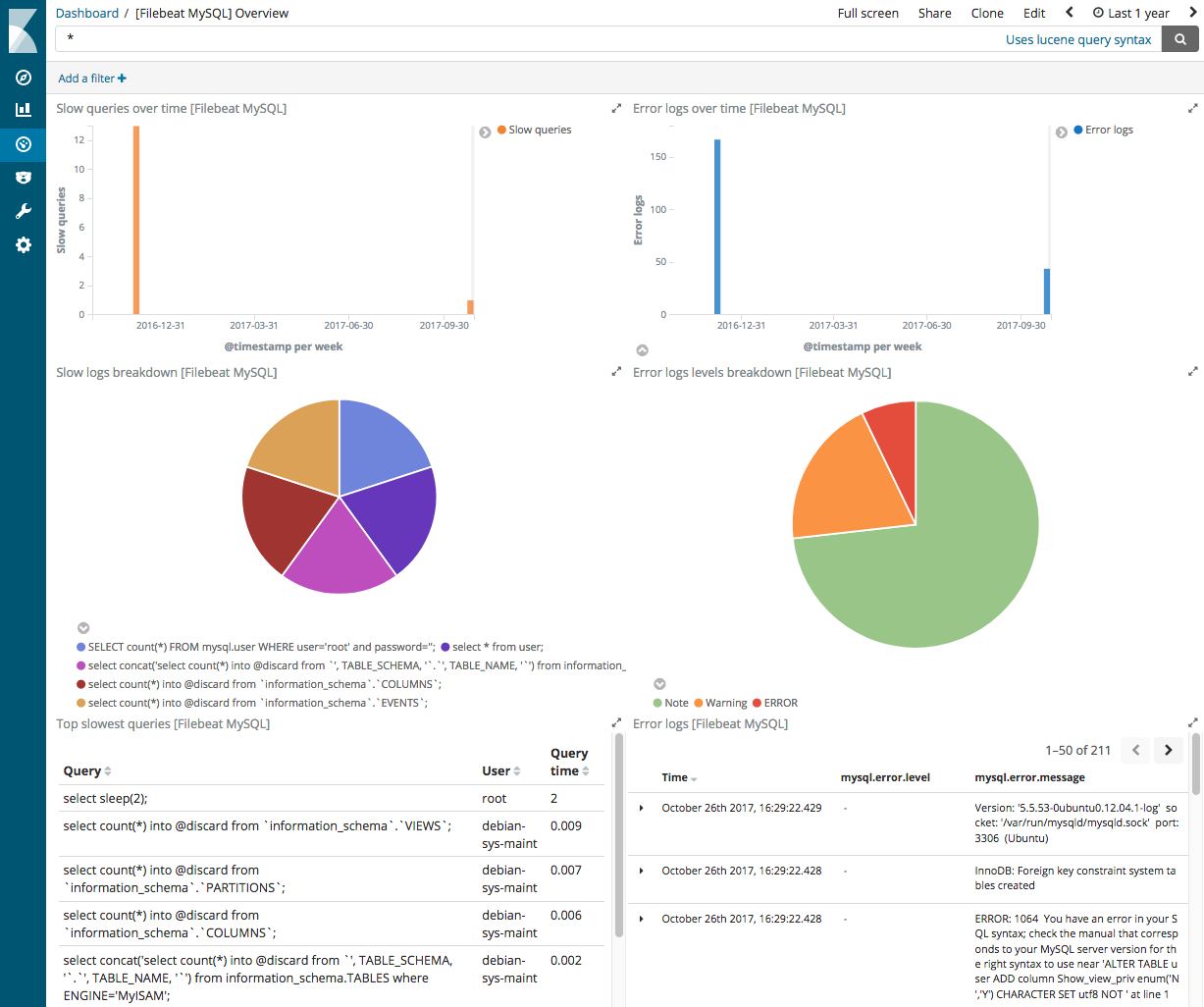MySQL module
editMySQL module
editThe mysql module collects and parses the slow logs and error logs
created by MySQL.
When you run the module, it performs a few tasks under the hood:
- Sets the default paths to the log files (but don’t worry, you can override the defaults)
- Makes sure each multiline log event gets sent as a single event
- Uses ingest node to parse and process the log lines, shaping the data into a structure suitable for visualizing in Kibana
- Deploys dashboards for visualizing the log data
Compatibility
editThe mysql module was tested with logs from versions 5.5 and 5.7.
On Windows, the module was tested with MySQL installed from the Chocolatey repository.
Set up and run the module
editBefore doing these steps, verify that Elasticsearch and Kibana are running and that Elasticsearch is ready to receive data from Filebeat.
If you’re running our hosted Elasticsearch Service on Elastic Cloud, or you’ve enabled security in Elasticsearch and Kibana, you need to specify additional connection information before setting up and running the module. See Quick start: modules for common log formats for the complete setup.
To set up and run the module:
-
Enable the module:
deb and rpm:
filebeat modules enable mysql
mac:
./filebeat modules enable mysql
win:
PS > .\filebeat.exe modules enable mysql
This command enables the module config defined in the
modules.ddirectory. See Specify which modules to run for other ways to enable modules.To see a list of enabled and disabled modules, run:
deb and rpm:
filebeat modules list
mac:
./filebeat modules list
win:
PS > .\filebeat.exe modules list
-
Set up the initial environment:
deb and rpm:
filebeat setup -e
mac:
./filebeat setup -e
win:
PS > .\filebeat.exe setup -e
The
setupcommand loads the recommended index template for writing to Elasticsearch and deploys the sample dashboards for visualizing the data in Kibana. This is a one-time setup step.The
-eflag is optional and sends output to standard error instead of syslog. -
Run Filebeat.
If your logs aren’t in the default location, see Configure the module, then run Filebeat after you’ve set the paths variable.
deb and rpm:
service filebeat start
mac:
./filebeat -e
win:
PS > Start-Service filebeat
If the module is configured correctly, you’ll see
INFO Harvester startedmessages for each file specified in the config.Depending on how you’ve installed Filebeat, you might see errors related to file ownership or permissions when you try to run Filebeat modules. See Config File Ownership and Permissions in the Beats Platform Reference for more information.
-
Explore your data in Kibana:
-
Open your browser and navigate to the Dashboard overview in Kibana:
http://localhost:5601/app/kibana#/dashboards.
Replace
localhostwith the name of the Kibana host. If you’re using an Elastic Cloud instance, log in to your cloud account, then navigate to the Kibana endpoint in your deployment. - If necessary, log in with your Kibana username and password.
-
Enter the module name in the search box, then open a dashboard and explore the visualizations for your parsed logs.
If you don’t see data in Kibana, try changing the date range to a larger range. By default, Kibana shows the last 15 minutes.
-
Open your browser and navigate to the Dashboard overview in Kibana:
http://localhost:5601/app/kibana#/dashboards.
Replace
Example dashboard
editThis module comes with a sample dashboard. For example:

Configure the module
editYou can further refine the behavior of the mysql module by specifying
variable settings in the
modules.d/mysql.yml file, or overriding settings at the command line.
The following example shows how to set paths in the modules.d/mysql.yml
file to override the default paths for slow logs and error logs:
- module: mysql
error:
enabled: true
var.paths: ["/path/to/log/mysql/error.log*"]
slowlog:
enabled: true
var.paths: ["/path/to/log/mysql/mysql-slow.log*"]
To specify the same settings at the command line, you use:
-M "mysql.error.var.paths=[/path/to/log/mysql/error.log*]" -M "mysql.slowlog.var.paths=[/path/to/log/mysql/mysql-slow.log*]"
Variable settings
editEach fileset has separate variable settings for configuring the behavior of the
module. If you don’t specify variable settings, the mysql module uses
the defaults.
For more information, see Specify variable settings. Also see Advanced settings.
When you specify a setting at the command line, remember to prefix the
setting with the module name, for example, mysql.error.var.paths
instead of error.var.paths.
error log fileset settings
edit-
var.paths - An array of paths that specify where to look for the log files. If left empty, Filebeat will choose the paths depending on your operating systems.
slowlog fileset settings
edit-
var.paths - An array of paths that specify where to look for the log files. If left empty, Filebeat will choose the paths depending on your operating systems.
Fields
editFor a description of each field in the module, see the exported fields section.